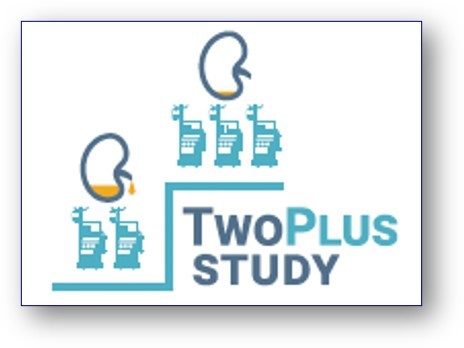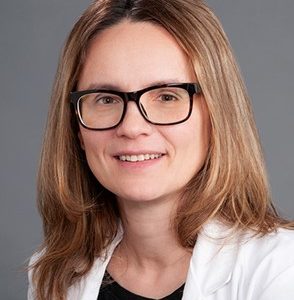Q&A with Mariana Murea, MD,
TwoPlus Study Principal Investigator
Tell us about your first experience with a kidney patient, personally or professionally, and what impressions that left on you as a fellow human being?
One of my most impactful experiences was with a patient receiving hemodialysis treatment in the hospital. I vividly remember the patient’s loud moans during the treatment. When I approached them, they shared their struggle with recurring muscle cramps during dialysis sessions, despite the doctors’ efforts to alleviate them. There are many challenges and aches that patients often endure as part of their dialysis treatments. We, the nephrology community, remain hopeful that advancements in science will improve the dialysis experience and allow patients to lead a more normal and comfortable life.

As we know, hemodialysis is a treatment prescribed by nephrologists for those with end stage kidney disease (ESKD). Interestingly, traditional hemodialysis was based on research in kidney patients with no residual kidney function, even though almost 1 in 4 patients still have residual kidney function when they start hemodialysis treatments. Previous studies have shown that an incremental treatment plan for hemodialysis (two hemodialysis sessions per week and then three hemodialysis sessions per week) is both safe and effective for patients who have residual kidney function, but not for those who do not have appreciable residual kidney function. Can you share how this spurred your efforts to develop the TwoPlus Study?
It was kidney patients who opened my eyes to something unusual, which is that patients starting hemodialysis are recommended the same intensity of treatment as those who had been on dialysis for years. Some patients asked me, “But Doc, I still make urine, do I really need all this dialysis?” Contrast this with a patient who makes very little urine but receives the same amount of dialysis as the patient who still makes a reasonable amount of urine. Virtually any other illness is treated according to the severity of the condition, but we are not applying this basic medical principle for kidney patients who choose hemodialysis. This is precisely what the TwoPlus study aims to address. Our goal is to evaluate the safety of a personalized hemodialysis approach, taking into account the patient’s level of kidney function at the beginning of hemodialysis treatments. This personalized approach, commonly called incremental hemodialysis, typically starts with two sessions per week, and as new clinical manifestations arise or the kidney function deteriorates, dialysis frequency can be adjusted to three times per week.
AAKP views kidney disease as both a healthcare and workforce issue. What type of health and lifestyle benefits may incremental hemodialysis improve and/or support?
Incremental hemodialysis allows for a more gradual and personalized approach at transition from chronic kidney disease to dialysis. By being less time consuming at the outset, it can be more manageable for patients and their caregivers to balance dialysis with work, family, and other obligations. It gives the patients and caregivers time to adjust to a new lifestyle. Perhaps no one would argue that nobody would opt for additional interventions unless they were indisputably necessary for their survival or well-being. This is also a key point we will investigate with the TwoPlus study.
In terms of health benefits, hemodialysis per se can be taxing on the body. The procedure can cause inflammation and reduce blood flow to various organs during treatment. Although patients with low residual kidney function—characterized by low urine output and reduced toxin excretion by their own kidneys—require hemodialysis three times per week or more, it’s important not to overuse it in patients with better residual kidney function. Balancing
the frequency of hemodialysis according to individual patient needs is crucial for optimizing health outcomes.
Can you describe the type of kidney patient that would be eligible to enroll in this study, where current study sites are located, and where they can learn more about the trial and how to participate?
Key eligibility criteria include patients who have just started three hemodialysis sessions per week and still possess a certain minimum amount of residual kidney function. Those meeting the criteria can enroll in the study at participating clinical trial sites such as Atrium Health Wake Forest Baptist, Renal Research Institute, Johns Hopkins, University of Virginia, University of North Carolina at Chapel Hill, Emory, University of Florida at Jacksonville, and Cleveland Clinic Case Western Reserve University. Visit www.twoplustrial.org for more information and a complete list of study site locations.
The TwoPlus Trial is supported by a grant from the Patient Center Outcomes Research Institute (PCORI). By mission and purpose, PCORI funds studies that can help patients and those who care for them make better informed healthcare decisions. PCORI also mandates that patients play an integral role through any project they fund. AAKP is proud to be a key stakeholder in the TwoPlus Trial. Can you share with us what it’s meant to the study thus far to have kidney patients and organizations like AAKP involved in standing up this study?
The support of AAKP and the involvement of patients afflicted with kidney disease have been invaluable throughout every phase of the study, from study conceptualization and its proposal to PCORI, to its implementation preparation and ongoing conduct at study sites. The unique perspectives offered by the AAKP and patient representatives have guided selection of patient-reported outcome measures and development of patient interface materials. AAKP and patient representatives are the parties that will ensure the study remains patient-centered and relevant to those living with kidney disease.
Innovation in the kidney space is important to patients, and their loved ones, they want to be involved and have their voice heard. Can you express the importance of why patients, in consultation with the healthcare professionals they choose to care for them, should have access to and choice of what treatment and/or treatment plan, whether established or new innovation, is right for them?
All healthcare organizations and medical providers have a duty to transparently discuss all available hemodialysis treatment options with their patients and recommend the most medically-appropriate option. Patients, in turn, have the right and responsibility to make informed choices and decisions about their care. Physicians should be able to respect patients’ choices, even when those choices differ from their recommendations. Another key problem is that, in current systems, the dialysis organizations and physicians face repercussions when the dialysis “quality metrics” do not meet specific benchmarks, regardless of patient choices.
As a leading researcher, you know well that it is not easy to develop a novel approach to treat or enhance care. What do you draw upon internally to keep your drive, optimism, and focus on patients going at full speed during the tough days?
I draw from the hope that we will utilize hemodialysis, a marvelous invention, in a more sophisticated, patient-centered manner, with greater thought, flexibility, and mutual accountability. This requires higher involvement of all dialysis team members and adapting current systems to better meet the needs and preferences of the patients we serve.
Final question – AAKP patients think this last question reveals a lot about a person – who is one of your heroes and why?
My aunt on my father’s side, a biology professor, inspired me to become a doctor. She often said, “There is nothing more noble and rewarding than helping a disadvantaged patient.” And she was absolutely right. I aspire to scale up this noble mission.
Mariana Murea, MD, is an Associate Professor in the Department of Internal Medicine, Section on Nephrology, at Wake Forest University School of Medicine. She received her medical training at Carol Davila School of Medicine in Romania, and completed her Nephrology training at Albert Einstein College of Medicine-Yeshiva University in New York, US. She has been the recipient of a GEMSSTAR (Grants for Early Medical/Surgical Specialists’ Transition to Aging Research) and R01 award from the National Institutes of Health (NIH)/National Institute on Aging (NIA), as well as the Butler Williams Scholar and ClinSTAR Scholar awards. She is a lead investigator in the national TwoPlus trial, a multicenter clinical trial focusing on hemodialysis, funded by the Patient-Centered Outcomes Research Institute (PCORI). Dr. Murea was honored with the Jenny Kitsen Patient Safety Award from the American Association of Kidney Patients (AAKP). She serves on the scientific review committee for the NIH/National Institute of Diabetes and Digestive and Kidney Diseases (NIDDK). She also serves as an Associate Editor of Kidney360, one of the flagship journals under the American Society of Nephrology.



















